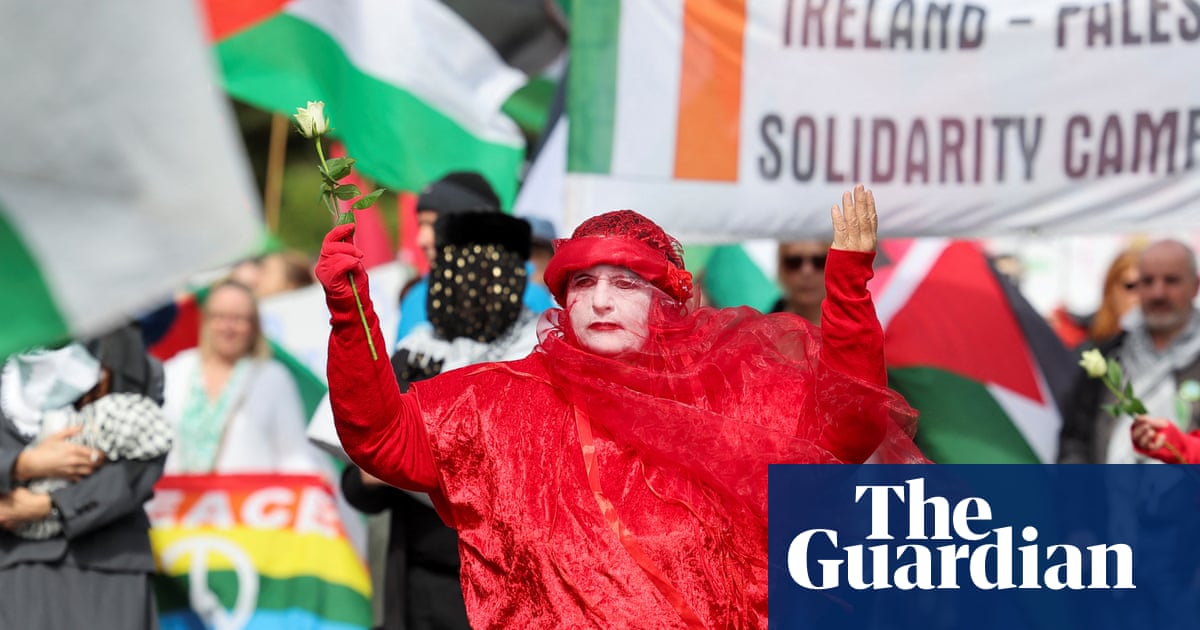The term was coined to disparage Ireland’s solidarity withPalestinebut has been adopted as a badge of honour that now adorns T-shirts, hoodies, pins and social media bios: welcome to Paddystine, home of the Paddystinians.
Irish activists have embraced the neologism as a galvanising term to campaign against Israel’swar in Gazaand to pressure the Irish government to do more to end the conflict.
The belief that it was originally intended as an insult by Israel supporters has fuelled its spread on TikTok and other platforms where Irish people proclaim themselves “Paddystinians” and also, in a repurposing of the old-fashioned female name Biddy, “Biddystinians”.
“It was being used as a negative,” Ross McGann, who has nearly 40,000 followers on TikTok, said this week. “Once I heard that I thought: ‘Nah, we can flip this around.’ It’s a very Irish thing to do – you take an insult and you flip it back.”
The 35-year-old content creator, who lives on a farm in County Offaly, incorporated Paddystinian into his TikTok bio and into his videos, which have been widely shared. “The word paddy has been used in a derogatory sense towards Irish people but in my family we have lots of Patricks, so to us paddy is a positive word. Given what’s happening inGazaI thought it’s only fair that we own it.”
The proliferation of the term has added another strand to Irish activism on Gaza amid controversy over outspokenstatements by the rap group Kneecap. With one of its membersfacing a terror charge, there is a question mark over the group’s invitation to perform at Glastonbury next month.
The origin of the term Paddystinian is unclear but many first heard of it in December after Israelclosed its embassy in Dublinto protest what it said was Irish government antisemitism and extreme hostility. Pro-Israeli voices online combined Paddy with Palestinian to underscore the accusation that Ireland, byrecognising Palestinian statehoodand lobbying the EU for a tougher line on Israel, was rewarding terrorism by Hamas.
Ben Cohen, a columnist for the Jewish News Syndicate, wrote that he initially regretted making a quip about Paddystinians because Paddy was an ageing pejorative about drunkenness and other Irish stereotypes.
“As it turns out, I needn’t have worried,”he wrote. “I discovered that the hashtag #Paddystinian was being eagerly adopted on social media by Irish supporters of Hamas. The accompanying posts were variously obnoxious or downright stupid, with many of those mocking the assertion that their country is antisemitic.”
Zoë Lawlor, the chair of theIreland Palestine Solidarity Campaign, welcomed the adoption of the term. “It was being used as an insult. People here thought that was hilarious so we really embraced it and turned it on its head. We started having fun with it at chants. Lots of people changed their Twitter names and social media handles to reflect that.”
Garments, badges, pins and other accessories emblazoned with “Paddystinian” have become popular merchandise. Some producers, such as the progressive campaign group Uplift, donate the proceeds to aid for Gaza.
Izzeddeen Alkarajeh, a Palestinian who serves Palestinian cuisine at Izz Cafe in Cork, sells Paddystinian pins. “It quickly became one of our top-selling items. It’s a beautiful example of how a term meant to mock can be reclaimed and redefined by the community,” he said via email.
The term amplifies awareness about Palestine among young Irish people, as do the Kneecap trio, who visited the cafe in February, said Alkarajeh. “Ireland has consistently shown solidarity with the oppressed, and this is especially evident now in the face of the ongoing crisis in Gaza.”
Jilan Wahba Abdalmajid, the Palestinian ambassador toIreland, laudedIrish solidarity. “Any link between the Irish people and the Palestinian people is a positive one. I hope the Irish people feel the same. We share the same history of colonisation and know too well how important freedom, justice, and human rights are.”
Activists say their goal is to leverage online solidarity to pressure the Irish state to match tough statements on Israel with actions, such as an enacting a bill to ban trade withillegal Israeli settlements on the West Bank, ending the Irish central bank’s authorisation of Israeli state bond sales in Europe and curbing the use of Irish airspace for flights suspected of carrying war material to Israel.
“Our pressure point is the Irish government,” said Lawlor. “The rhetoric is very strong but they have to back it up with actions. If they do that we can start a snowball effect within the EU.”
